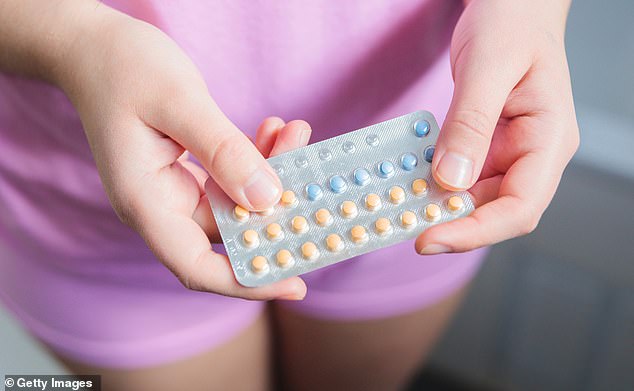HRT and vital heart drugs are among the medications at risk of record shortages, industry leaders warn
- 111 medicines, including antibiotics and anti-epilepsy medicines, are experiencing supply problems
Record drug shortages could leave patients struggling to get hormone replacement therapy, contraceptives and heart pills, industry leaders warn.
The British Generic Manufacturers Association (BGMA) said a row over payments could impact a host of common medicines.
The trade body, which represents manufacturers and suppliers, said about 111 medicines – ranging from antibiotics to epilepsy drugs – are experiencing supply problems.
This is the highest level ever and more than double the number of medicines that faced shortages at the beginning of last year.
The BGMA blames an NHS medicines levy and says the rising tax is stopping pharmaceutical companies from supplying medicines to Britain.
The trade body, which represents manufacturers and suppliers, said around 111 medicines – ranging from antibiotics to epilepsy drugs – are facing supply problems
Instead, they increasingly take their finite stock elsewhere, often leaving pharmacists looking for alternatives.
To avoid overcharging the NHS, drug manufacturers will be taxed if the health care bill for branded drugs rises by more than 2 percent a year.
Under the Voluntary Scheme for Branded Medicines Pricing and Access (VPAS) agreement, taxes paid by manufacturers are dependent on the NHS medicines bill.
Two years ago this rate was 5.1 percent, but this year it has risen to 26.5 percent, which the BGMA says makes Britain unattractive for businesses.
Chief executive Mark Samuels said: ‘Problems with the supply of generic medicines are increasing and patients are unfortunately being affected as they represent four out of five NHS prescriptions.

The British Generic Manufacturers Association (BGMA) said a row over payments could impact a host of common medicines
‘This is not about making less profit, but rather about losses as a direct result of VPAS.’
Dr. Leyla Hannbeck, head of the Association of Independent Multiple Pharmacies, said community pharmacists report one in 10 medicines are in short supply.
She said: ‘This has reached crisis proportions and is having a knock-on effect across the sector.
‘They have to spend many hours getting medicines for patients. This is on top of running a pharmacy in these difficult times, with many closing their doors for good due to underfunding.”
Shortages of HRT medicines have been a problem for some time and have been highlighted by the Mail’s Fix the HRT Crisis campaign.
A spokesperson for the Department of Health and Social Care said: ‘We have seen no compelling evidence that higher payment rates lead to delivery problems, given the measures available.’
